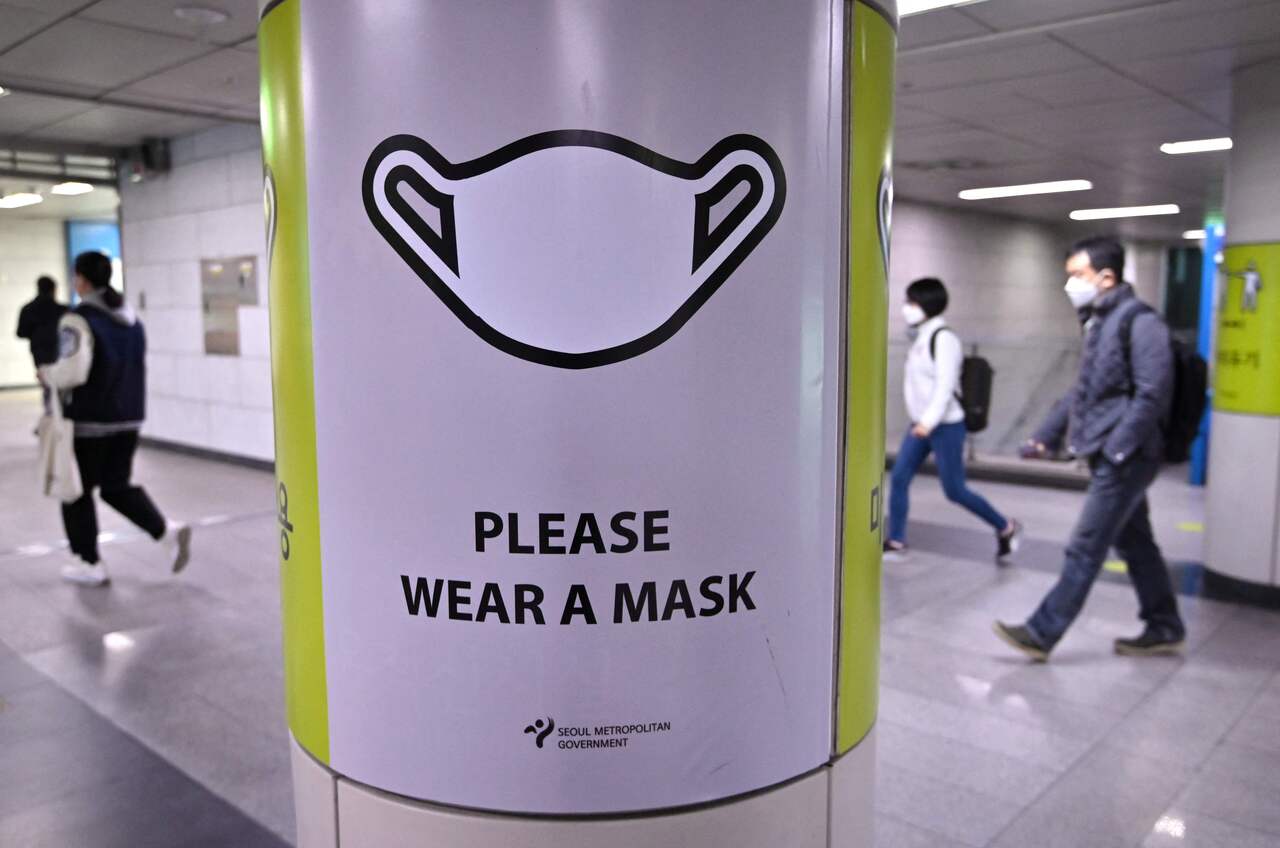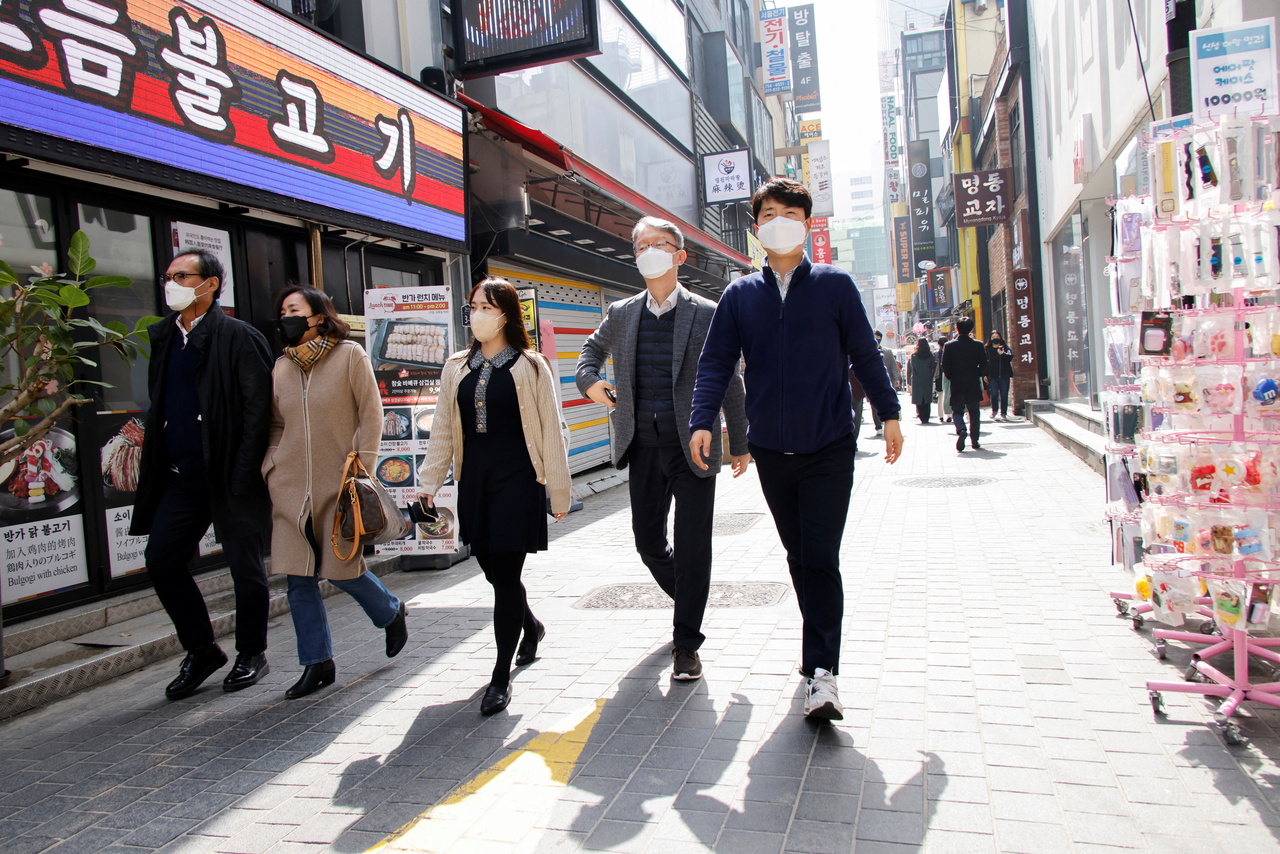In South Korea, a spike in Covid-19 cases meets a collective shrug
Sign up now: Get ST's newsletters delivered to your inbox

It was the second straight day the country set a record, with one in every 20 people testing positive over the past seven days.
PHOTO: AFP
Follow topic:
SEOUL (NYTIMES, XINHUA) - South Korea reported its peak daily coronavirus infection number of the entire pandemic on Thursday (March 17), recording 621,328 cases in a country of 50 million people.
It was the second straight day the country set a record, during a weeklong surge of Omicron cases that has dwarfed all its previous waves, with one in every 20 people testing positive over the past seven days.
But during this surge, South Korea, which responded to past swells with all-out efforts to track, test and isolate the infected, is responding with a collective shrug.
With the vast majority of its adult population vaccinated and about nine out of 10 of those aged 60 and older having received a booster shot, South Korea is pushing ahead with plans to ease social distancing measures, relax border restrictions and learn to live with the virus' risk, even as it is experiencing some of the highest per-person infection rates anywhere in the world.
"Everyone used to be hush-hush about getting infected, like you were causing a nuisance," said Mr Lee Soo-won, a bartender who owns two cocktail bars in central Seoul with a long wait-list almost every night. "Now we're congratulating people on getting super immunity."
He added: "The perception is it's like getting a cold."
That represents a dramatic shift compared with how South Korea responded to any spike in cases during the first two years of the pandemic.
Then, even when the increase in cases paled in comparison with other parts of the world - a couple hundred cases a day, or even a few dozen - the country's streets emptied out and officials convened emergency meetings to impose curfews or limitations on gatherings.
Throughout the pandemic, the South Korean government has touted its aggressive, and at times invasive, approach to the virus, calling its playbook the "K-quarantine model" and encouraging other countries to follow suit.
Now, the government has said it is moving away from severe restrictions to letting the virus move through the population, in an effort to allow small businesses to recover and normal life to resume.
On Friday, South Korea reported 407,017 new Covid-19 cases as of midnight Thursday compared to 24 hours ago, raising the total number of infections to 8,657,609.
Officials have also decided to further ease social-distancing rules for two weeks as the tightened quarantine measures roiled the businesses of small merchants.
The Ministry of Health and Welfare said the moderated social-distancing guideline will be kept in place from March 21 to April 3, forecasting that the pandemic in the country could peak this week or as late as next week.
The ministry said the spread of the highly contagious Omicron variant reduced the efficiency of the social-distancing scheme, noting that the partial adjustment of the anti-virus measures was aimed at helping the businesses of small merchants and mitigating the inconveniences of people.
Under the new guideline, the maximum number of people allowed for private gatherings will be raised from six to eight nationwide, but the business hour curfew will be left unchanged.

<p>People wearing masks walk in a shopping district amid the coronavirus disease (COVID-19) pandemic in Seoul, South Korea, March 16, 2022. REUTERS/Heo Ran</p>
PHOTO: X06978
Restaurants, cafes, indoor sports facilities and karaoke as well as nighttime entertainment facilities, such as bars and nightclubs, will be permitted to open until 11pm.
Regardless of vaccination, 299 people will be allowed to gather for events, such as sports events, festivals and concerts. The maximum number of people allowed to join religious services will be 70 per cent of the total seating capacity.
On April 1, the country plans to begin allowing vaccinated travellers to enter without quarantine.
"There isn't the patience any more," said research fellow Jang Young-ook at the Korea Institute for International Economic Policy. "There was a degree of exaggerating the virus' risk involved to get people's cooperation."
He added: "But that cooperation is a type of resource, and it was squandered and depleted."
The latest surge has barely made a dent in data showing people's visits to retail stores, when earlier waves in 2020 led to drops by one-third or more, Dr Jang said.
Ms Kim Jin-ah, 28, a Seoul resident who works at a department store, said she wavered between feeling afraid of the virus closing in around her - her father recently tested positive - and resigning herself to the fact that she may get it sooner or later, and that the risk of getting seriously ill was low.
She said she feared no longer being able to dine out or travel if the surge led to the government reimposing restrictions. "I'm afraid our daily life might evaporate," Ms Kim said.
But she said she also thought that South Korea had prematurely dropped measures against the virus, including vaccine passes. "I worry that things might devolve into a situation that feels like a disaster movie," she said.
Also on edge are South Korea's medical professionals, who are concerned the about-face in South Koreans' attitudes on the virus could result in its hospitals being overwhelmed, especially as more medical workers get infected.
Dr Eom Joongsik, an infectious disease specialist at the Gachon University Gil Medical Centre in Incheon, said he and his colleagues were bracing themselves for the weeks ahead when the full brunt of the latest surge is expected to hit their emergency rooms and intensive care units.
He said that he also worried about the impact on other serious illnesses if the medical system were to be stretched thin. Officials said on Thursday that 65.6 per cent of its critical care beds were full.
In Dr Eom's view, the government's timing on its new approach to the virus was off.
"The decision to relax the measures could have been made after we're past the peak," he said.

